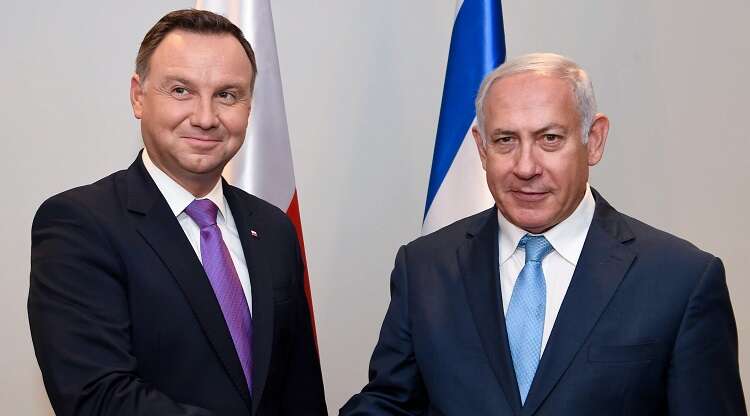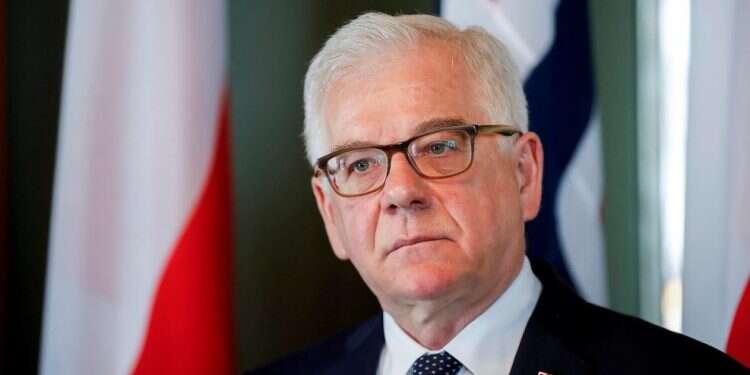The Polish Foreign Ministry had a chance to breathe easy following the conclusion of the Fifth World Holocaust Forum in Jerusalem last week, as Warsaw's fear that Russian President Vladimir Putin would use the event to "distort World War II history and attack Poland" did not come to pass.
The event, attended by dozens of world leaders, royals, and statesmen, was overshadowed by a bitter dispute between Poland – where Nazi German occupiers operated Auschwitz and other infamous camps – and Russia, the successor state to the Soviet Union, whose Red Army liberated Auschwitz on Jan. 27, 1945, over the historical memory in the West with regard to their respective roles in World War II.
Follow Israel Hayom on Facebook and Twitter
Russian officials have been claiming that Poland, invaded in 1939 by German and Soviet forces, actually bears the blame for starting the war. Western historians see those allegations as a cynical ploy to minimize Soviet responsibility. The Polish government has been infuriated by Russia's moves, which is believed to stem from Moscow's desire to weaken Polish influence in the European Union.
Poland's government has defended the nation's record, recalling how its wartime government–in–exile sought to save Jews, and listing cultural and economic damage that Poland suffered after Soviet troops took control of its territory at the end of World War II.
Polish President Andrzej Duda, who did not attend the event in Jerusalem as he was not invited to speak alongside Putin and the presidents of Germany, France, and Israel, is set to host Israeli President Reuven Rivlin and German President Frank–Walter Steinmeier as part of the official events marking the 75th anniversary of the 1945 liberation of the Auschwitz–Birkenau concentration camp.
Among the participants in the event will be Polish Foreign Minister Jacek Czaputowicz, who in an exclusive interview with Israel Hayom, adopts President Rivlin's proposal to "leave history to the historians."
Q: How come that 75 years after the liberation of Auschwitz, different entities are fighting over historical facts?
"We are rather consistent with our interpretation and contribution to the knowledge of those events. Our archives are open, our institutes make the information available, the memorials at the camps, which are on Polish soil – Auschwitz, Majdanek, Belzec, Sobibor, Stutthof – are preserved. It is our duty. More than 3.5 million people visit each year these former camps. More than 2 million come to Auschwitz. Poland belongs to countries, which best preserve material and facts. We treat history with full respect, and I think that other countries follow us."
Q: At the World Holocaust Forum, Israeli President Rivlin suggested, "Let's leave history to the historians". Is it possible?"
"It's a good idea to let historians investigate properly the facts concerning World War II, the Holocaust and recent history. Our knowledge should be based on facts and research made by historians. At the same time, we have to remember our recent history in order to be conscientious of the dangers for us and not to make any mistakes or wrong decisions in the future."

Q: Do you think it's possible to reach a common narrative about what happened during WWII or will we keep on having different national narratives?
"I think that discussions are very welcomed if they are based on facts. We can not just agree on something and seal it. We are open to discussions based on facts because we know what is the truth, how it happened, who made it, how many polish Jews and non–Jews suffered. As far as Poland is concerned, we lost six million lives, 3 million of them were Polish Jews. It's part of our history, our heritage, and we preserve it. Therefore we built monuments, museums, we renovate cemeteries. We do a lot in preserving. It's important for us because Polish Jews created part of our history. You can not discuss long periods of Polish history, without the Jewish contribution to that history. We lost that because of WWII and the Holocaust imposed by the Nazi Germans."
Q: What is for you the importance of the commemoration event in Auschwitz and what are the lessons to be drawn from this experience for the present and the future?
"We commemorate the liberation of Auschwitz every year, but since it's a 'round' anniversary the event will be an important one. For us, the most important is to give a voice and to listen to survivors. It's the last [few] years that they are still with us. It should be a de-politicized event – with the presence of Presidents Duda, Rivlin, and Steinmeier – paying respect and making sure that we will remember that horrible experience forever. The danger is to use that history as a tool for political gains in current politics. We see that trend. For example, the recent attacks of President Putin. We should avoid using history as a weapon in contemporary fights."
Q: Why would Putin use history as a weapon against Poland?
"I don't think it's against Poland but against the truth, against the ones who perished during WWII. Poland was occupied by Germany and Russia. It is an obvious historical fact. Everybody knows how WWII started. A Part of Poland was occupied almost 2 years by Russia, our citizens were forcibly expelled to Siberia and other parts of Russia, thousands of Poles were executed in Katyn – among them about 500 were Jews.
"The Soviets saw them all as Poles. They didn't make any difference between those of Jewish origin or not. On the German side, some Jewish officers survived, because they were interned in camps for officers. Why Putin is doing that? He wants to create disagreement between western allies. He uses disinformation campaigns. It's one of them. He wants to present Russian history in a better way and to get legitimacy for today's agenda.
"Poland belongs to the countries, like EU member–states, that do not accept Putin's current foreign policy – the aggression against Ukraine, the annexation of Crimea, aggression against Georgia, Russia's role in Syria, in Libya, Central Africa, Venezuela. Our policy with our allies of the EU and NATO is simply to maintain sanctions to condemn this policy because it is against the interests of the international community and international law. For us, international law is the basis for international order.
"We can not accept aggression against any country. It's not good if we, as an international community, allow giving Putin historical instruments to have more influence or to legitimize his international standing. If he is treated as an important leader without saying that we condemn his behavior, he has achieved what he wants. It doesn't mean that we shouldn't maintain contact with Russia. It's our neighbor. But giving him a forum to express his ideas is another thing. The Western countries have to coordinate policy to somehow limit or constrain his aggressive behavior, to deter him. Therefore Poland cooperates closely with the US within NATO. NATO changed its attitude in order to face challenges to the western world made by Russia."
Diplomatic crisis resolved
Q: A crisis strained Israel and Poland's relations two years over the amendment of the Act on the Institute of National Remembrance. Is there anything you regret about that time?
"It was indeed a crisis, but it was solved very quickly because this law was repealed. There were some doubts raised, mostly by scientists and even countries, that it might limit the freedom of research or of expression. These arguments were convincing, so we withdrew the law. The joint declaration of MPs Netanyahu and Morawiecki was important.
"It's over. Israel is very important for us, as a Jewish state. Everything that is related to the Jews is very important due to our history and feelings of empathy. It's our long-term goal to maintain good relations with Israel, not only because of the history but also because Israel is an important country today and we have many possibilities to cooperate.
"With US Secretary Pompeo I organized the Warsaw conference, enabling Israel and PM Netanyahu the possibility to address their concerns regarding the situation in the Middle East and Iran. It was a big success. It was the first time for many years that people saw on the same panel foreign ministers of Arab countries and PM Netanyahu. We want to contribute to peace and stability in the Middle East. That is a crucial issue for Israel. We closely cooperate with the US and at the same time, we are a member of the EU and aware of the different opinions there regarding the Middle East. After the conference happened a certain evolution due to some words or interpretations made by Israeli politicians."
Q: And even Ministers.
"PM Netanyahu also had some unclear statements concerning the Holocaust during the Warsaw Conference. But, something, which indeed spoiled our relations were the words of the newly nominated Foreign Minister [Israel] Katz, which were largely offensive to the Polish society. Of course, there are anti-Semites everywhere, I wouldn't dare to say that there is no anti-Semitism Poland at all. But to refer it to the whole Polish nation is something unfair. President Duda made it clear that he expected a clear apology."
Q: The US is about to publish a report on the issue of restitution, based on JUST Act 447. Do you think that this might be a problem for Poland?
"It depends on the substance of the report. When you look at our system, there is a clear legal procedure for restitution. Many Poles, including of Jewish origin and of every other ethnicity, who lost their property during war and the communist time, ask for restitution or compensation and it happens through a legal process. Poland is one of the countries, which did a lot on this issue."
Q: You don't think that this could again poison the atmosphere between Israelis, Jews, and Poles?
"I don't think it's an Israeli resolution, or is it? We will provide information if there is a request. Again, Poland belongs to those countries, which did a lot concerning the value of property, which was returned."
Q: There was an expectation in Israel that Poland will move its embassy in Israel to Jerusalem. Is that a possibility?
"As far as the moving of the embassy is concerned, we coordinate our policy with the EU and we do not envisage such a move. The policy on this issue is clear, according to the UN. We are for a two-state solution. The status of Jerusalem, the state of Palestine and peace should be negotiated between the Israeli and the Palestinians.




